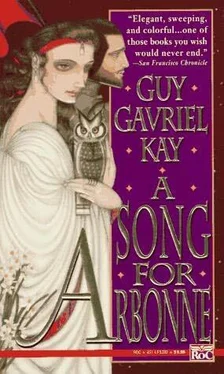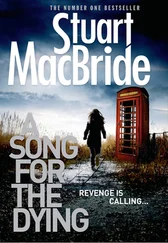Guy Kay - A Song for Arbonne
Здесь есть возможность читать онлайн «Guy Kay - A Song for Arbonne» — ознакомительный отрывок электронной книги совершенно бесплатно, а после прочтения отрывка купить полную версию. В некоторых случаях можно слушать аудио, скачать через торрент в формате fb2 и присутствует краткое содержание. Год выпуска: 1992, Жанр: Фэнтези, на английском языке. Описание произведения, (предисловие) а так же отзывы посетителей доступны на портале библиотеки ЛибКат.
- Название:A Song for Arbonne
- Автор:
- Жанр:
- Год:1992
- ISBN:нет данных
- Рейтинг книги:5 / 5. Голосов: 1
-
Избранное:Добавить в избранное
- Отзывы:
-
Ваша оценка:
- 100
- 1
- 2
- 3
- 4
- 5
A Song for Arbonne: краткое содержание, описание и аннотация
Предлагаем к чтению аннотацию, описание, краткое содержание или предисловие (зависит от того, что написал сам автор книги «A Song for Arbonne»). Если вы не нашли необходимую информацию о книге — напишите в комментариях, мы постараемся отыскать её.
A Song for Arbonne — читать онлайн ознакомительный отрывок
Ниже представлен текст книги, разбитый по страницам. Система сохранения места последней прочитанной страницы, позволяет с удобством читать онлайн бесплатно книгу «A Song for Arbonne», без необходимости каждый раз заново искать на чём Вы остановились. Поставьте закладку, и сможете в любой момент перейти на страницу, на которой закончили чтение.
Интервал:
Закладка:
Valery looked around quickly, but Rudel's voice had been carefully low and the square before the house was empty. Even so, Blaise felt his pulse jump at the mention of what he'd said tonight. It had certainly had results.
It seems we do have some things to talk about after all, Daufridi of Valensa had said, looking with hard appraisal at Blaise, and then had listened intently, heavy brows drawn together, as Bertran de Talair outlined a number of propositions, some of them startling, one, at least, quite terrifying.
In the street outside the house Valery was shaking his head. "I'm an old man tonight. Too many twists in the road for my poor head. I want a pillow more than I can say. You two go on. Be young a little longer yet."
Blaise was torn, in fact, between equally strong desires: one for the quiet of his room, and another for some adequate external response to the excitement within himself. In the past when Rudel had suggested a night abroad, he had seldom demurred.
In those first months in Gotzland and then Portezza, after he'd left Gorhaut the first time—the thought came suddenly, new-minted, to him—he himself seemed to have been performing his own driven search for an avenue of escape. It seemed, after all, that the winding route through so many taverns and towns, all the tournaments and courts and castles, the night and morning roads, dawn mist above battlefields and a murder in Faenna, had brought him back, on this cool autumn evening in Arbonne, to Gorhaut, to the country that was his home, and to the Treaty of Iersen Bridge, which he had twice sworn—the second time on his mother's blood on a night of storm at Garsenc—that he would never accept.
Oaths by younger sons, even those of the most powerful families, rarely meant a great deal in the world. It seemed, tonight, as if his own vow might just possibly be different. Either that, or the paths of folly were even wider and smoother and more welcoming than they were said to be, and he was squarely set upon one of them now.
He was not going to fall asleep, he realized. Valery, with a crooked smile at the two of them, walked up to the palace door and knocked softly. The viewing grille slid back, and then the door was opened by the coran on watch. "Good night," Bertran's cousin called, over his shoulder. "Try to be quiet when you do come back. I promise you I'll be sleeping."
Blaise watched him go in, then turned to Rudel. By the lamplight he saw his friend's head tilted to one side, eyebrows arched expectantly in that expression he well remembered. Valery had said earlier that the young Bertran had been much like this; it wasn't hard to see the similarity.
"Lead on," he said. "If events continue as they seem to have begun, and you do intend to stay the course with me, this may be the last chance we'll have to enter a tavern as corans for hire and nothing more."
"Stay the course?" Rudel said, his voice swirling upwards as they began to walk. "Do you think you could possibly get rid of me now?" He turned a corner, heading towards the distant glow of lights by the market. It was a lovely night, clear as a shepherd's dream. "All the riches of my father wouldn't make me leave a game as diverting as this one has become."
"Oh good," said Blaise dourly. "I'm pleased to be amusing you again. What happens when I send you to your father to ask for all his riches to support us?"
Rudel Correze laughed. He was still laughing when six men ran out from the alley and blocked their path, before and behind, bows levelled at the two of them.
It was quiet in the dark street then, with the only lights a long way ahead or behind. Blaise, looking at the deadly purposeful shapes in front of them, had a brief image of Bertran somewhere in the city with Soresina de Baude, then another of Valery slowly climbing the winding stairs in the Talair city palace, heading peacefully to his rest.
"I find this," he heard Rudel say, "deeply offensive, I must say. I was greatly looking forward to that drink in The Senhal. You do know," he said, raising his voice for the benefit of the silent men surrounding them, "that I am the son of Vitalle Correze, and you are certainly dead men—dead in a most unpleasant fashion—if you molest us further."
One thing about Rudel, Blaise thought, using the time his friend was buying them to scan the shadowy street and alleys for possibilities of escape—he was never shy about invoking his father's name. Came with a good relationship, perhaps. Blaise would prefer to die before calling upon Galbert de Garsenc's even more prominent name as a means of succor.
A preference that might well be about to find its own grim realization. These weren't outlaws or renegades. With a sinking feeling, Blaise thought he recognized one of the bowmen. They wore no identifiable livery—naturally—but he was almost certain he'd seen the nearest man before: last summer, in Tavernel, standing with En Urté de Miraval in the entrance to The Liensenne on Midsummer Eve.
"I think I know them," he murmured to Rudel. I'm afraid this is bad."
"I didn't think it was particularly good," Rudel replied tartly. "You cut left, I go right?" They had swords, useless against archers. Blaise could think of no better plan. The streets were empty here. They were a long way from the market. They would have to hope uncertain light might make the bowmen miss.
"I'm sorry," he said. "You were better off being angry with me."
"Not really. Bad for the heart and liver, anger. That's what my father's doctor says. Live a placid life, he advises. I think I might try that next."
Poised, preparing to spring as soon as Rudel moved, Blaise briefly wondered why none of the archers had spoken a word or even made a gesture of command.
Then, when four more men strode quickly out from the alley and came up behind them, he understood. Why give commands when all you want to do is freeze your victims long enough for their executioners to slaughter them? He recognized one of these men, too. It was his last clear thought.
"A placid life, that's the thing," he heard Rudel repeat dreamily. Out of the corner of his eye he saw his slender, aristocratic friend crumple to his knees, just before the swinging blow from a wooden staff knocked him senseless too.
When he came to, it was with a headache so brutal the room lurched sickeningly as soon as he opened his eyes. He closed them quickly. What remained, as consciousness lingered tenuously, was an awareness that he was lying on something unexpectedly soft and there was a scent surrounding him. He knew that scent, it had associations for him, a great many. And an instant later, as full awareness returned, Blaise realized where he must be. His eyes snapped open with the shock and he twisted his head around to see. The movement made him immediately nauseated and he gasped with pain.
"I do regret that," a woman's voice said, "but I had to advise them you might not come willingly."
"Why bother?" Blaise gasped. He couldn't see her. She was behind him. It was only when he tried, with another painful effort, to turn his body that he realized that his limbs were bound. He was on her bed, which explained the softness, and his hands and feet were tied to the four bedposts. The never-forgotten scent of her perfume was all around him. "Why didn't you just have me killed in the street?"
"What?" said Lucianna Delonghi, moving at last into his field of vision. "And deprive myself of this pleasure?"
He had not seen her for more than a year. She was clad in silk so diaphanous she might as well have been naked to his sight. The glitter of jewellery was all about her: a diadem in her hair, sapphires at each ear, diamonds and sea pearls around her throat. There were rings on her long fingers, gold and silver or ivory at each wrist and one spectacular, memorable pendant suspended between her breasts, red like the fire crackling on the hearth. She liked jewellery, he remembered, she liked fires in her rooms even when it wasn't cold, she liked cords and knots and toys in her bed.
Читать дальшеИнтервал:
Закладка:
Похожие книги на «A Song for Arbonne»
Представляем Вашему вниманию похожие книги на «A Song for Arbonne» списком для выбора. Мы отобрали схожую по названию и смыслу литературу в надежде предоставить читателям больше вариантов отыскать новые, интересные, ещё непрочитанные произведения.
Обсуждение, отзывы о книге «A Song for Arbonne» и просто собственные мнения читателей. Оставьте ваши комментарии, напишите, что Вы думаете о произведении, его смысле или главных героях. Укажите что конкретно понравилось, а что нет, и почему Вы так считаете.










